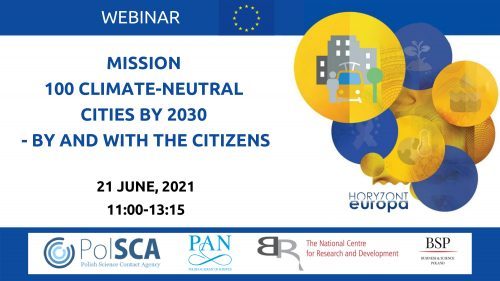As a part of a joint initiative of the PolSCA Office and the office of the National Center for Research and Development in Brussels – Business Science Poland – on June 21 an online meeting was held on one of the areas of European missions implemented under Horizon Europe. The Climate Neutral and Smart Cities mission will support new ideas, research and innovation that will help cities undergo systemic transformation to become climate neutral.
The meeting entitled “100 climate-neutral cities by 2030 – by and for the citizens” began with the presentation of the main goals and objectives of the mission by an expert from the European Commission – Ms. Rosalinde van der Vlies (Directorate General for Research and Innovation ). Then, two discussion panels were moderated by Prof. Hanna Gronkiewicz-Waltz – chairman of the Board of the Mission “Climate neutral and smart cities”. The Polish Academy of Sciences was represented by: Dr. Cezary Mazurek – Poznań Supercomputing and Networking Center affiliated with the Institute of Bioorganic Chemistry of the Polish Academy of Sciences, and Prof. Bożena Degórska – Institute of Geography and Spatial Organization of the Polish Academy of Sciences.
The other panelists were such experts in the field of urban issues as: Aldo Vargas (National URBACT Point, Association of Polish Cities), Dr. Dawid Krysiński (University of Wrocław), Katarzyna Dyzio (Municipality Activity Office at the City Hall of Łódź) and Marta Bejnar-Bejnarowicz (Municipal Movements Congress).
In the discussion entitled “Transport – integrated urban planning”, Dr. Cezary Mazurek emphasized the key role of technology, and more broadly speaking, of digital transformation in the development of cities in order to achieve climate neutrality. At the same time, he showed – on the example of Poznań – how technology is already used in this area, i.e. showing the possibility of creating a green, eco-mobile city, including environmentally friendly and sustainable transport. Secondly, he discussed integrated digital solutions for monitoring air pollution levels in specific urban locations, thanks to which it is possible to better plan and manage traffic. In addition, Dr. Mazurek referred to various forms of activating residents: from running “living” laboratories, through cooperation with experts, activities of municipal think tanks, to the functioning of a special co-working space.
Then, prof. Degórska linked the development of cities towards a neutral climate with the planning of green systems, at the same time pointing to the strong relationships between this process, the development of transport and climate change. In her opinion, it is necessary to use appropriate planning instruments, including much earlier planning of urban green areas, which will allow for rational design of solutions increasing the quality of life of city dwellers. Yet another aspect raised in the discussion was the problem of urban sprawl – in this respect, a potential antidote may be the implementation of the concept of the “green ring”, which allows, to some extent, to mitigate the negative effects of urbanization.
The debaters of both panels also pointed out several times to various challenges in the field of city management, as well as the need to tighten cooperation between city authorities and residents, especially when it comes to public consultations and civic budgets. In this spirit, they talked about a “co-created city”, about “co-creation”, where great importance is attached to the process of collecting information from residents, presenting them with the balance of benefits and losses of a given solution, translating individual movements of municipal authorities into “local language”, and it enhances the role of local leaders and city movements that are treated as partners.
The full agenda of the meeting (in Polish) can be downloaded here. The mission report is available at the link.



